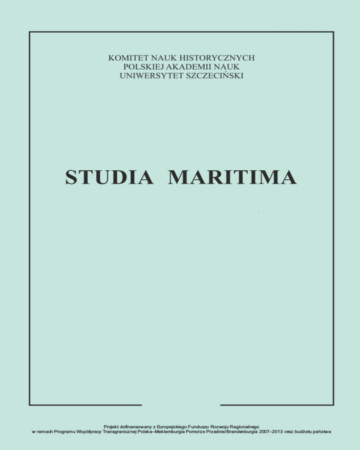






| Authors: |
Andrzej
Groth
Akademia Pomorska w Słupsku, Instytut Historii i Politologii |
| Keywords: | English Baltic trade the Eastland Company (North Sea Company/the Company of Merchants of the East) modern times |
| Data publikacji całości: | 2015 |
| Page range: | 14 (5-18) |
| 1. | Bogucka M., Handel zagraniczny Gdańska w pierwszej połowie XVII wieku, Wrocław 1970. |
| 2. | Doroszenko B.B., Torgowlja i kupeczestwo Rigi w XVII weke, Riga 1985. |
| 3. | Fiedler H., Danzig und England. Die Handelsbestrebungen der Engländer vom Ende des 14. bis Anfang des 17. Jahrhunderts, „Zeitschrift des Westpreussischen Geschichtsvereins”, H. 68. |
| 4. | Groth A., Kupcy angielscy w Elblągu w latach 1583–1628, Gdańsk 1986. |
| 5. | Groth A., Handel morski Elbląga w latach 1585–1700, Gdańsk 1988. |
| 6. | Groth A., Der Braunsberger Seehandel 1638–1700 im Vergleich zu den anderen Häfen des Frisches Haffs, „Zeitschrift für die Geschichte und Altertumskunde Ermlands” 1989, Bd. 45. |
| 7. | Groth A., Żegluga i handel morski Kłajpedy w latach 1664–1722, Gdańsk 1996. |
| 8. | Groth A., Statystyka handlu morskiego Elbląga w latach 1585–1712, cz. 2: Wywóz drogą morską, Słupsk 2007. |
| 9. | Kędzierski J.Z., Dzieje Anglii 1484–1830, Wrocław 1986. |
| 10. | Lepszy K., Stefan Batory a Gdańsk, „Rocznik Gdański” 1932, t. 6. |
| 11. | Mierzwa E.A., Anglia a Polska w epoce Jana III Sobieskiego, Łódź 1988. |
| 12. | Mierzwa E.A., Anglia a Bałtyk w okresie rewolucji purytańskiej i restauracji, Piotrków Trybunalski 2001. |
| 13. | Simson P., Danziger Inventar 1531–1591, [w:] Inventare hansischer Archive des 16. Jahrhunderts, Bd. 3, Münschen–Leipzig 1913. |
| 14. | Simson P., Die Handelsniederlassung der englischen Kaufleute in Elbing, „Hansische Geschichtsblätter” 1916, Bd. 12, H. 1–2. |
| 15. | Zins H., Geneza angielskiej Kompanii Wschodniej (Eastland Company) z 1579 r., „Zapiski Historyczne” 1964, t. 29, z. 3. |
| 16. | Zins H., Przywilej Elżbiety I dla angielskiej Kompanii Wschodniej, „Rocznik Elbląski” 1966, t. 3. |
| 17. | Zins H., Anglia a Bałtyk w drugiej połowie XVI wieku, Wrocław 1967. |